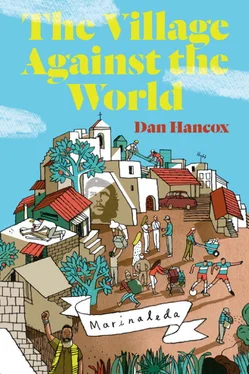In the winter that followed, Sánchez Gordillo was to receive the ultimate accolade in Andalusian pop culture: he was honoured in a chirigota – a unique, phenomenally popular form of satirical folk song, emanating from the province of Cadiz. Traditionally, chirigota groups comprise around ten to fifteen people, who sing chorally in the streets and squares, in costume, performing a repertoire of self-composed songs about the state of the nation, the government, or society; sometimes pruriently, always laced with wit. Suppressed by Franco, they have made a huge comeback in recent decades, and the annual knockout competition for best chirigota group, as part of the Lenten carnival in Cadiz, has become a national cultural and TV event.
But Sánchez Gordillo wasn’t just the subject of a satirical song, as politicians often are – he was the model for a group’s entire repertoire: Los Gordillos, they called themselves. Every detail of their outfits was based on how he had looked in the news reports the previous August: twelve adult men dressed in white shorts, red check shirts, green keffiyehs, sun hats and desert boots, wearing bushy grey beards, and incorporating props like supermarket trolleys, Andalusian flags, and loud-hailers into their performance. They were one of the hits of the 2013 carnaval , reaching the quarter-final of the official competition and winning the hearts of many aficionados with songs about the supermarket raids performed in front of a giant Mercadona backdrop.
While his notoriety was skyrocketing and the media requests continued to flood in, the day-to-day operations of the village were not disturbed by this Sánchez Gordillo mania – Marinaleda was robust enough to withstand controversies over t-shirt slogans and irreverent comedy songs. They had endured worse. But the economic crisis was starting to have an impact on the village in less visible ways.
Two weeks after Spain’s second general strike of the year, on 30 November 2012, a three-day ‘march of the women’ from Marinaleda to Seville was due to arrive in the city’s historic Plaza de España for a rally, and to seek an audience with the regional government to discuss the crisis and its effect on farming communities. It was an expression of the sporadic feminist orientation of the village’s politics. ‘Everything we have won here, has been thanks to the women’, Sánchez Gordillo once told me, and although some aspects of Spain’s old-fashioned gender roles persist (especially when it comes to housework), women are over-represented on the village council and in general assemblies.
The square was almost deserted at midday on a Thursday out of season, with just a few tourists inspecting the mosaics and an ice-cream seller in a daydream, untroubled by custom. Into this tranquillity arrived SAT and the marinaleños : a couple of hundred marchers, most of them women, accompanied by two large, slow-crawling vans with numerous speakers strapped to their rooves. Chants about revolution and the bankers rang out into the empty plaza as they parked up outside the Andalusian regional government offices.
Their march over, packed lunches were distributed: mortadella sandwiches wrapped in tinfoil and cartons of orange juice. A local TV news crew and a couple of regional newspapers arrived. There were a lot of keffiyehs, a lot of SAT flags, a lot of sensible walking clothes, and smiles all round – ordinary people who are used to struggle as a way of life. A woman wheeled a buggy past me, and it took me a moment to notice it was being used to transport a bundle of Andalusian flags. When you routinely go on three-day marches to make a point about farm subsidies, it’s fair to say it comes with a uniquely intense attitude to political engagement, to the way politics sits in your everyday life.
The speeches began, and Diego Cañamero proceeded to explain – in as fiery manner as is possible, given the subject matter – why it was necessary to abolish the peonadas , the daily record-keeping system by which jornaleros receive social security payments. ‘We must eliminate the rural employment plan, and eliminate capitalism,’ he continued. With his SAT t-shirt and jeans, cropped silver hair, and reddish-brown skin, clean-shaven and weathered like old leather, he always makes a good partner to Sánchez Gordillo.
I hadn’t noticed el alcalde at first: he did not seem to be one of the four speakers on the podium, and I thought perhaps he had skipped a march for once. Then I spotted him deep in the crowd, about halfway back – an unusually modest position for a man who is normally always at the forefront, in good times and bad. He was not talking, but listening; not giving, but receiving instruction and inspiration. The scene looked slightly askew.
After the revelation that no, no one from the government was going to come out and talk to them, they held a ceremonial burning of the peonada forms for the cameras, accompanied by a chant of contra el paro, lucha obrera (against unemployment, worker’s struggle), followed by a rendition of Andaluces, levantaos , the Andaluz hymn, sung powerfully and slowly, right fists raised high.
As the crowd mingled and dispersed, and Cañamero did a few interviews, Sánchez Gordillo just seemed to slink off quietly. Some of the SAT trade unionists from outside the pueblo , who hadn’t met him before, asked to have their photo taken with him. He graciously agreed to each request in turn, shook hands and kissed cheeks, smiling a little wearily, but content to hear their expressions of admiration. He carried the aspect of a jet-lagged celebrity being whisked through a mob of fans to his hotel. And before I could approach him myself, he was gone.
The Plan de Empleo Rural (PER), the rural employment plan, is a government social security scheme introduced in the 1980s, designed to subsidise the lack of work in the fields outside of harvest time and prevent another mass exodus from Spain’s rural areas. Jornaleros who have worked in the field at least thirty-five days, and thus picked up thirty-five peonadas , are entitled to six months’ social security payment of €400 per month. The olive harvest had been particularly bad that year, however, and it was becoming increasingly difficult for some people to meet that thirty-five-day minimum, and thus, to survive.
The spectre of the early 1980s, and rural families going hungry, was returning with a vengeance. Even the Andalusian PSOE joined SAT and the marinaleños in a call on the government to address Andalusian rural poverty and reform the PER, instead of, as Andalusian PSOE number two Mario Jiménez put it, just ‘asking the saints and virgins’ for salvation.
Eventually, in January 2013, they lowered the qualification for the subsidy to twenty peonadas per person. But even that was not enough; and again, it was not just SAT saying so. Spain’s biggest union, the CCOO, was also convinced many would not be able to put food on the table. The peonadas became the only discussion topic at a number of general assemblies in Marinaleda at the start of 2013. The mayor’s CUT colleagues from the local council explained they could fight, and perhaps they should fight – but they must be prepared for the fact that they might not win this one. Calling for across-the-board welfare payments for all poor Andalusian jornaleros , irrespective of whether they’d met the twenty days quota, was ideologically and practically necessary; but they could see how bad government finances were – the trend was to make swingeing cuts to social security, not expand it – and the mood in the village was not optimistic.
One thing stood out about these bleak messages about the lack of money coming into the village, something I first noticed at a general assembly in December 2012: the messages weren’t being delivered by Sánchez Gordillo. He wasn’t in the Sindicato that evening, leading the discussion, as he would have been normally, and he was absent again when the peonadas were discussed at further general assemblies in January. I didn’t realise it at the time, but Sánchez Gordillo’s unusually demure presence, buried in the crowd in Seville that day, was one of his first and last public appearances for months.
Читать дальше












